BP Pulse has confirmed it has withdrawn from the workplace charging market to focus on its charging hubs and rapid network across the United Kingdom (UK).
The business confirmed it will honour all existing installations, warranties, as well as service and maintenance agreements for any workplace charging customers, but no new business in relation to this segment of the market will be taken on.
A spokesperson for the company told Fleet News it is looking to deliver a “simpler, more focussed and higher value company”.
The spokesperson said: “We are constantly assessing opportunities to improve our competitive position and better serve our customers. Our aim is to be the number one ultra-fast and rapid network in the country.”
“We’ll continue to focus on building on-the-go electric vehicle (EV) charging hubs and installing charging at our existing BP forecourts.”
The company said fleet customers can continue to access the BP Pulse network through BP’s fuel and charge card.
The firm has more than 3,000 rapid and ultrafast chargers installed at over 1,000 locations across the UK.
Fleets like DPD have been working closely with BP Pulse after signing an EV charging infrastructure deal at the end of 2024.
The work included upgrading existing charging infrastructure and installing new rapid (DC) charging across dozens of DPD UK’s depots, supporting the fleet operator’s growing EV fleet.
BP had actually indicated its intention of finding a buyer for its BP Pulse business in the Netherlands earlier this year, as part of its full year financial results statement.
Speculation over BP as a whole had ramped up to the point rival Shell had to respond in late June that “it has not been actively considering making an offer for BP and confirms it has not made an approach to, and no talks have taken place with, BP with regards to a possible offer”.
The firm declined to comment when asked if it was looking for a buyer for BP Pulse before withdrawing, or whether it was still looking for a buyer for the division.
BP’s exit adds complication to fleets’ decarbonisation plans
Paul Hollick, Association of Fleet Professionals (AFP) chair, acknowledged that as a commercial enterprise, BP is well within its rights to change direction, but said the exit has caused “added complication” for some fleets.
Hollick said BP’s exit does open up space for other suppliers to step in, but shifting to a new supplier “is an added complication to have to deal with, in addition to the wider challenge of decarbonisation”.
BP’s exit from the market highlights how some fleets have to strike the balance between choosing to spread projects across multiple partners and the risks of sole supply.
One UK fleet manager who preferred not to be named said BP’s exit has created “chaos and nervousness” among fleet managers planning out their workplace charging strategy.
They said: “The previous dilemma for fleet managers over charging infrastructure was whether to go with a start-up or the big established name that has history and the financial clout behind them. If a company like BP pulls out, where does that leave you?”
The fleet manager said companies going out to tender with workplace charging infrastructure need to appoint two suppliers, one with the contract and another ready to take over as backup.
Another non-negotiable is appointing suppliers that operate on the OCPP.
This avoids the situation where infrastructure has been put in place that is more closed and can only easily be updated and properly maintained by the original supplier.
The fleet manager said: “Fleets have to take BP at their word that service levels will be maintained, there will be updates, superb maintenance response and management. If you’re relying on this infrastructure to operate your electric fleet, is that a chance you’re willing to take?”
Source: FleetNews
READ MORE
-
Ekoenergetyka: What do major CPOs like Telpark and IONITY look for?
With a strong industrial backbone and a robust after-sales strategy, Polish manufacturer Ekoenergetyka is stepping up its game in southern Europe. The company aims to become the go-to partner for scalable, reliable and locally adapted charging infrastructure.
-
PowerGo opens new fast-charging hub in Belgium
With charging points of 30 and 150 kW, Basic-Fit and PowerGo offer a convenient charging solution for both gym members and EV drivers passing through.
-
chargecloud llega a 80.000 cargadores conectados: ¿Cómo funciona el ecosistema alemán de software eMobility que llega a España?
chargecloud nombra a Joel Martín como Country Manager para liderar su lanzamiento en España. Con su plataforma modular y fiable de 360°, la empresa alemana pretende posicionarse como una referencia de CPMS en el sur de Europa.










